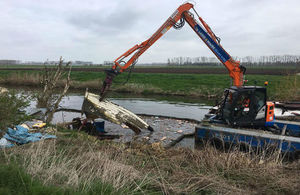
The Environment Agency removed the 'Compass Rose' because it was sunk and abandoned. The EA is removing a dozen such boats from Anglian waterways this month.
The wreckage of a boat that helped evacuate Dunkirk during the Second World War has been removed by the Environment Agency after it was sadly left to sink in the River Lark, Cambridgeshire.
The sunken 'Compass Rose' had been abandoned by its owner, who officers were unable to contact after numerous attempts, and had to be removed because it was obstructing navigation on the river and could pose a risk to other boaters and the environment.
After several years in the water, the wreck was too badly damaged to salvage and came to pieces as it was being removed from the water by a mechanical grabber mounted on a pontoon.
The 40-foot (approximately 12 metre) wooden cruiser is one of a dozen vessels being removed this month as the Environment Agency seeks to clear sunken, abandoned, unregistered and illegal boats from the Rivers Nene and Great Ouse.
Some of the boats have been abandoned and fallen into disrepair, while others, like the 'Compass Rose,' have sunk and need to be removed so they don't cause pollution or pose a hidden hazard to other vessels.
Most have not been registered with the Environment Agency, despite the fact that boaters are required by law to register any vessel they keep, use or let for hire on Environment Agency waterways. Not doing so can lead to prosecution, a hefty fine and a criminal record.
Paul Separovic, Waterways Operations team leader at the Environment Agency, said:
This is a sad ending for one of around 700 boats that supported a heroic, life-saving effort during the war. It's regrettable the Compass Rose survived that momentous event only to be left to sink nearly 80 years later.
We know the value these boats can carry – not just financially but sentimentally and, in this case, historically – and that's why we're encouraging boaters to make sure their vessels are registered with the Environment Agency, which also means they're more likely to be well-maintained and checked for safety.
Paul continued:
In each of these cases, we've made numerous attempts to contact and work with the boats' owners to resolve the issues, but without success – so now we're forced to remove the boats so they don't pose a danger to people, nature or wildlife.
Most of these boats aren't registered, making them illegal. Boaters' registration charges go straight back into maintaining the waterways, locks and moorings boaters have come to enjoy.
Skipping out on these charges is unfair to other boaters, tens of thousands of whom enjoy our beautiful and historic rivers every year. It puts the future of our treasured waterways at risk.
As well as helping pay for upkeep and improvements on the waterways, registering a boat means it has been properly safety-checked and insured, making it safer for other water users and the environment.
The Environment Agency looks after more than 350 miles of navigable waterways in the Anglian network, which includes the Ancholme, Black Sluice, Glen, Welland, Nene, Great Ouse and Stour, including locks and facilities.
If you suspect an illegal or unregistered boat on the waterways, report it to the Environment Agency on 03708 506 506 or email






